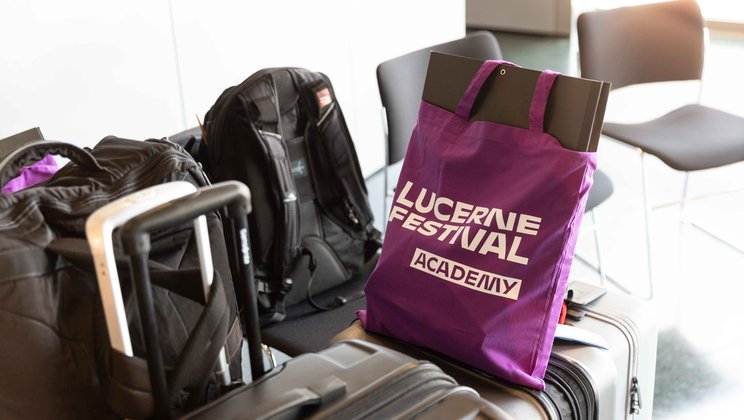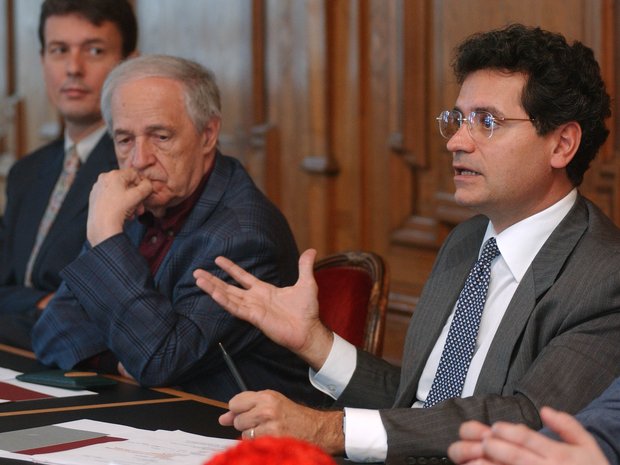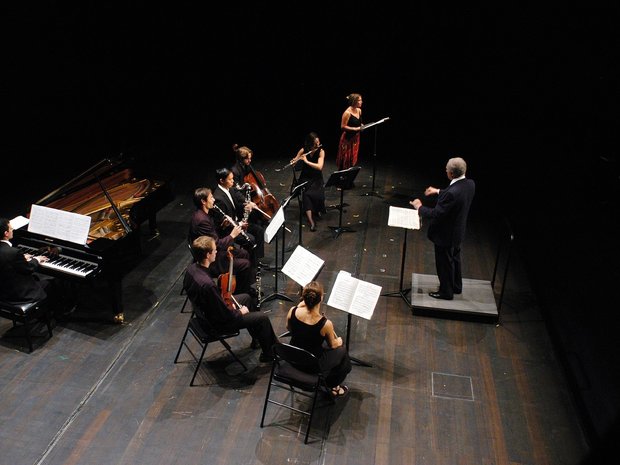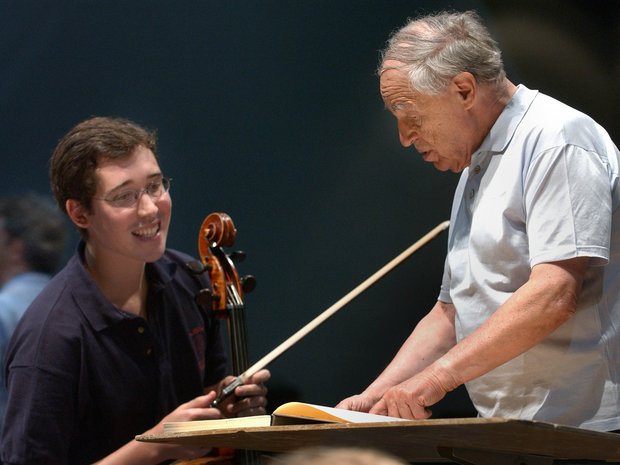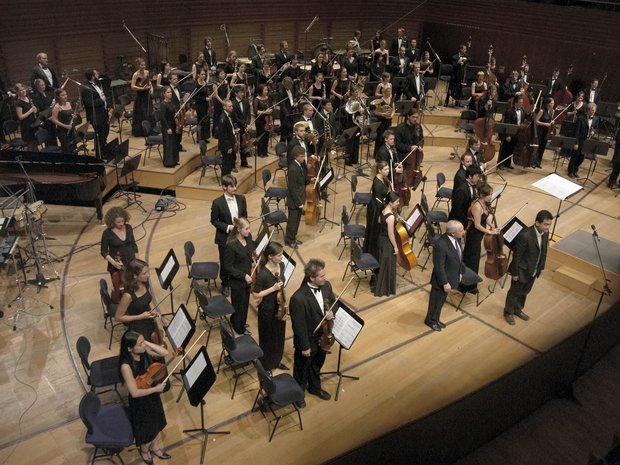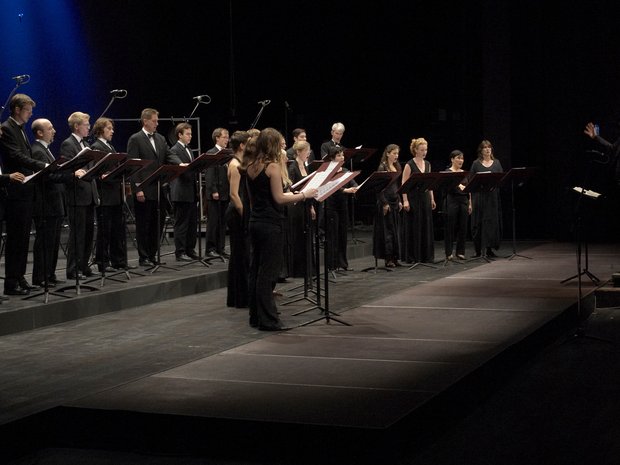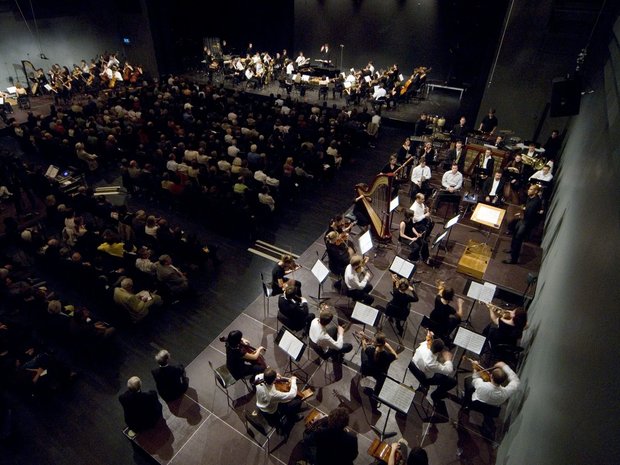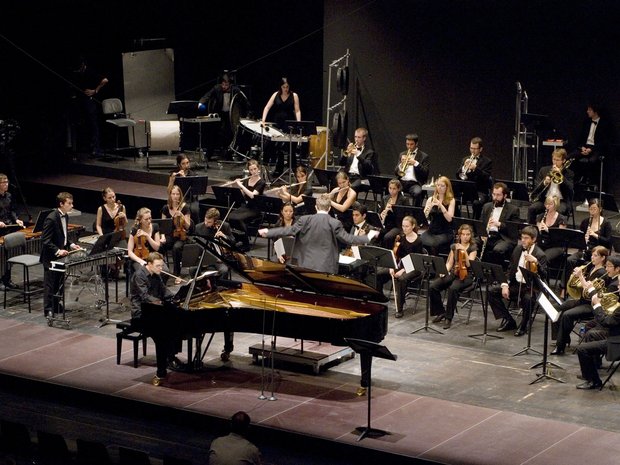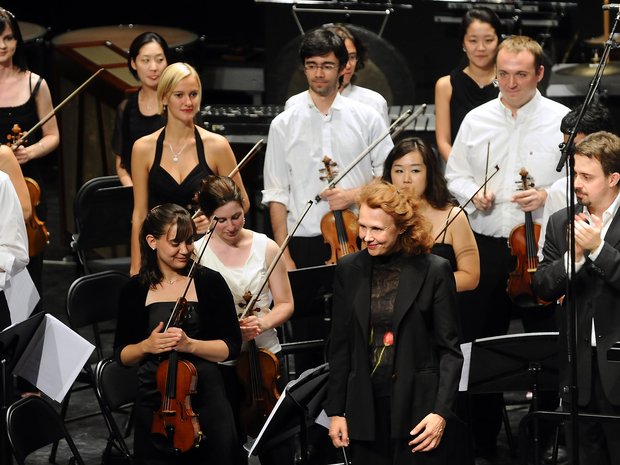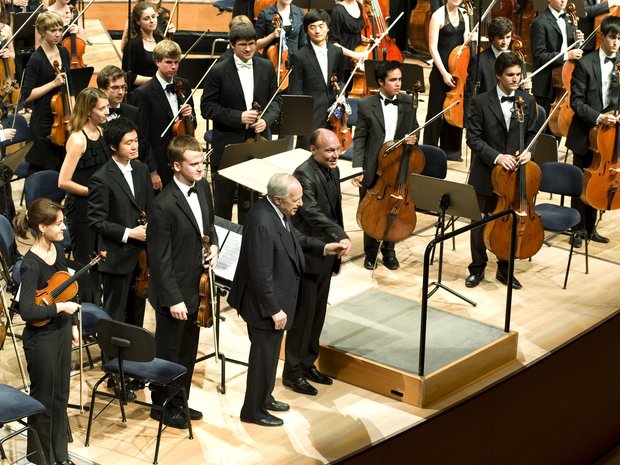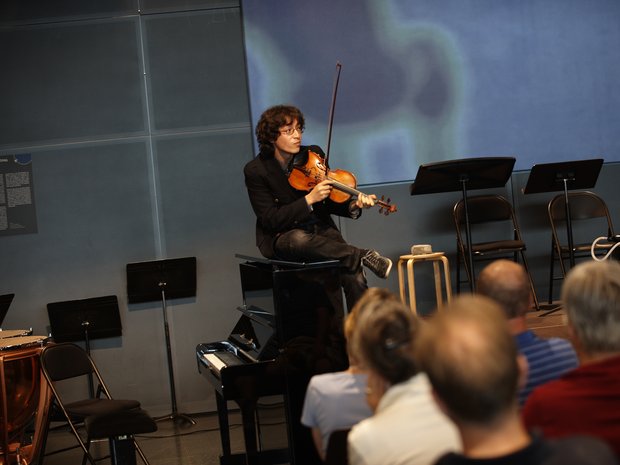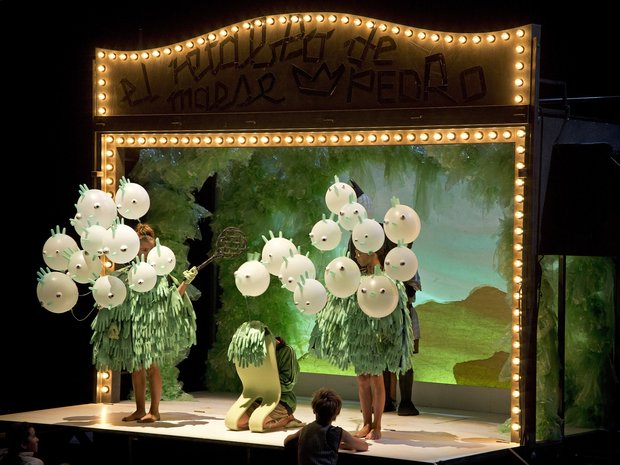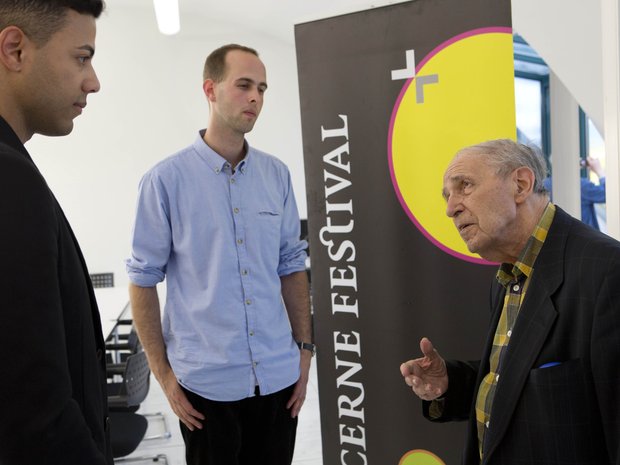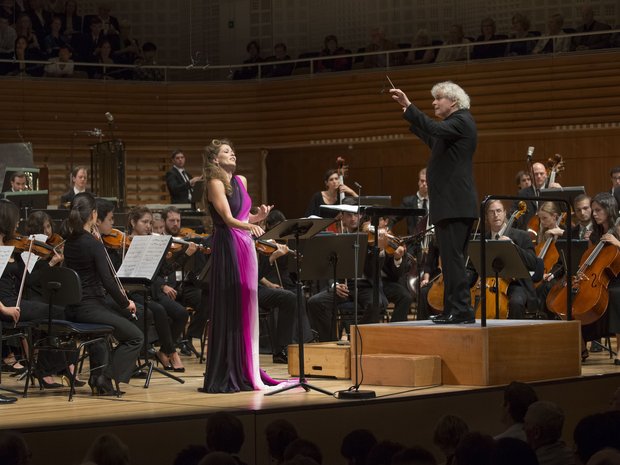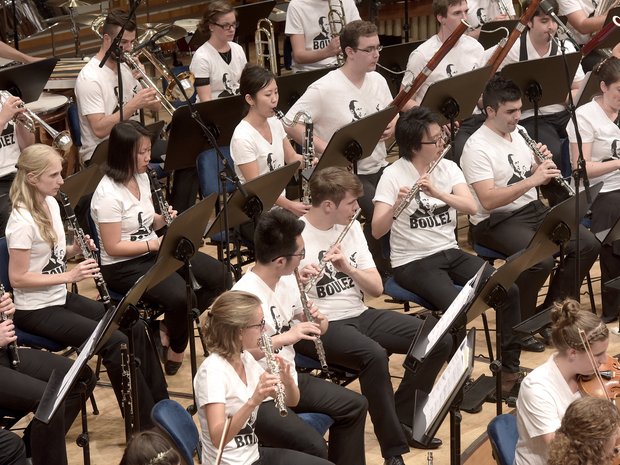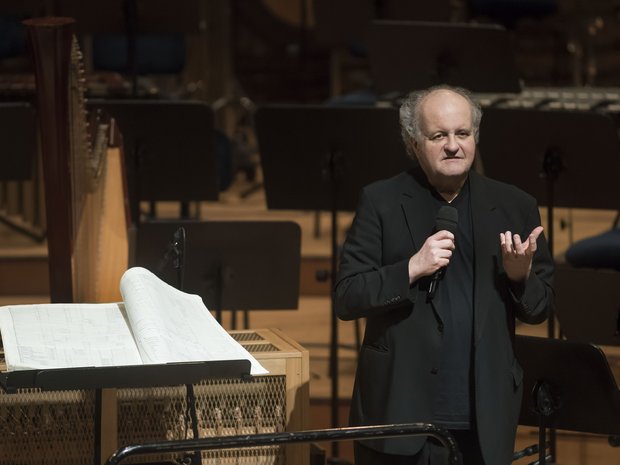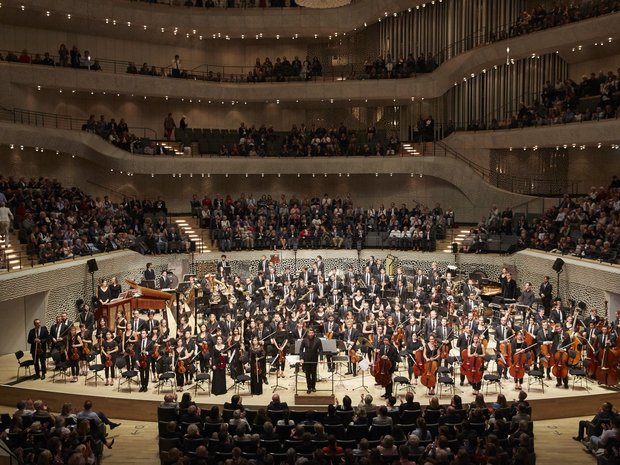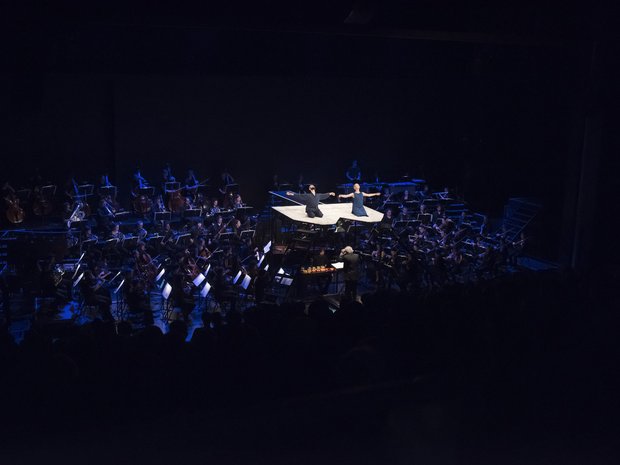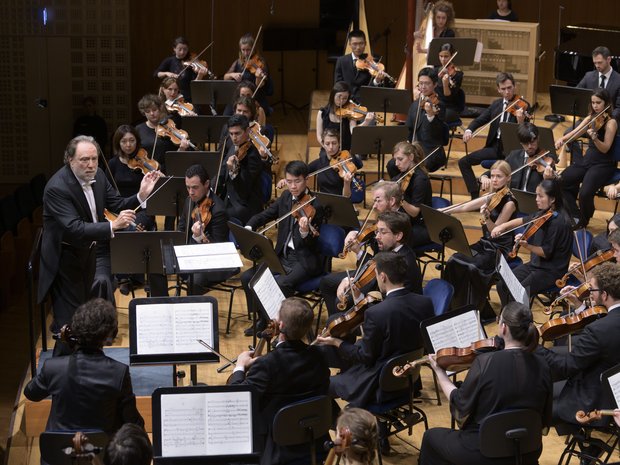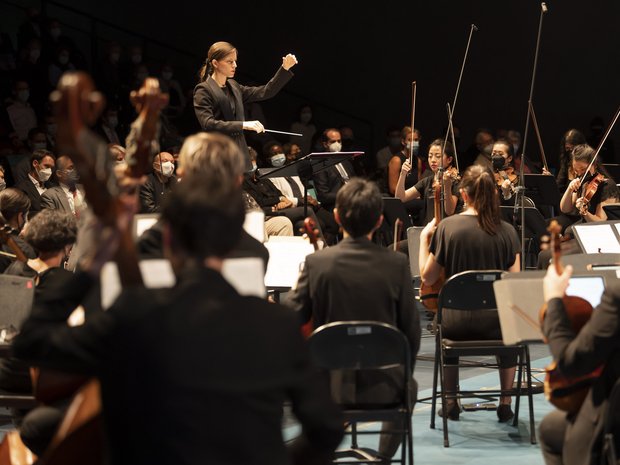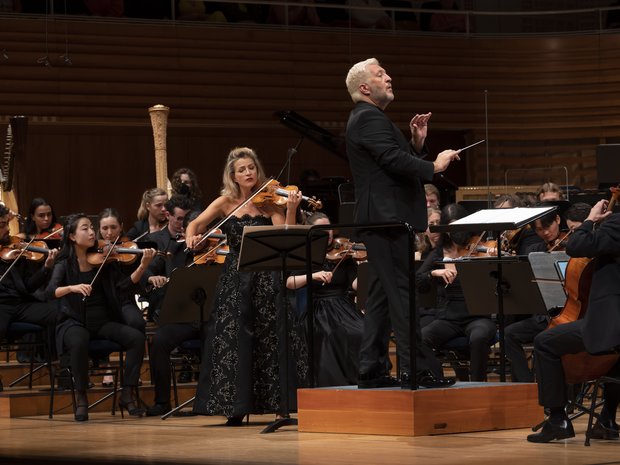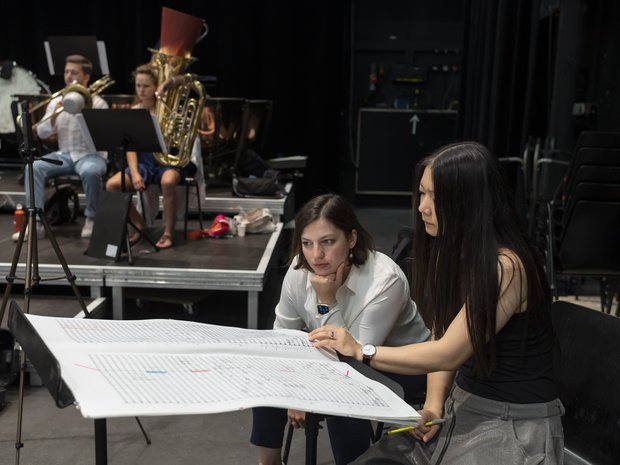Article
Lucerne Festival Academy Year by Year
The big retrospective of 20 years of the Lucerne Festival Academy for all lovers of facts and figures.
Find out more about the Academy's anniversary here.
-
2004 – 2009
2004
- The Lucerne Festival Academy was founded by Pierre Boulez and Michael Haefliger. The centerpiece of the plan was an Academy orchestra that would study and rehearse symphonic works of the 20th and 21st centuries, with solo, chamber music, and ensemble repertoire to also be taught. Pierre Boulez led a master class for young conductors.
- Musicians from the Ensemble intercontemporain began coming to the Academy regularly as instrumental coaches this year.
- In the founding year of 2004, Maurizio Pollini, the summer’s “artiste étoile,” gave a master class for young pianists focusing on the music of the 20th and 21st centuries.
- The program of the concert on 16 September would become a paradigm of Boulez’s Academy dramaturgy over the years to come: the focus was on Earth Dances by Harrison Birtwistle, as well as on Arnold Schoenberg's Piano Concerto, Op. 42, Boulez’s Notations and Noësis by Hanspeter Kyburz.
- Works were commissioned every three years. The creative process extended over two years. During this period, the composers had the opportunity to write their pieces and work on them with Boulez within the Academy. The first commissions were awarded to the composers Christophe Bertrand and Dai Fujikura and were premiered in the summer of 2005.
- Already in 2004 it was part of the concept that interested visitors could follow the work of the Academy through such formats as the “Academy forum,” through open rehearsals, workshops, and seminars.
2005
- Part of the Academy involved a one-week master class for string quartets under the direction of Walter Levin and Helmut Lachenmann, composer-in-residence for the summer of 2005. The course repertoire focused on string quartets by Beethoven, Berg, and Lachenmann. The JACK Quartet was founded following the master class in Lucerne.
- The summer programming included Amériques by Edgard Varèse and the Lyric Suite by Alban Berg, as well as the Concerto for Bass Clarinet by the young Italian Bruno Mantovani.
- A special highlight was the world premieres of the two works commissioned from the young composers Dai Fujikura and Christophe Bertrand. They had worked on their scores with Pierre Boulez during the previous year.
- Boulez once again led a conducting master class.
- In the “Forum Atelier” format, the audience was invited to gain insights into the creative work of the Academy through workshops and master classes and to have contact and exchange with the performers.
2006
- In keeping with the Festival theme of “Language,” about 24 singers were invited to take part in the Academy alongside the instrumentalists.
- One focus was dedicated to Arnold Schoenberg and Luciano Berio. Schoenberg’s works were closely linked programmatically to the summer exhibition “Harmony and Dissonance: Gerstl-Schönberg-Kandinsky” at the Kunsthaus Zug, where a concert with Pierre Boulez also took place.
- A total of seven world premieres were performed.
- Following the summer Academy in Lucerne, the Lucerne Festival Academy performed two concerts at the Klangspuren Festival in Schwaz/Tyrol.
2007
- Under the baton of Artistic Director Pierre Boulez, an all-Hungarian program featuring works by György Ligeti and György Kurtág was performed, as well as the world premiere of the violin concerto Seven by Peter Eötvös and Bartók’s large-scale orchestral work The Miraculous Mandarin.
- A second program focused on Karlheinz Stockhausen’s composition GRUPPEN for three orchestras and three conductors. This was linked to a master class for young conductors led by Peter Eötvös. The work was performed twice, first with Pablo Heras-Casado, Lin Liao, and Kevin John Edusei from the conducting master class, then with Jean Deroyer, Peter Eötvös, and Pierre Boulez on the podium.
- The Lucerne Festival Percussion Group under its Artistic Director Michel Cerutti rehearsed new works written by young composers for the twelve-piece percussion ensemble, as well as two commissioned works by the Swiss composer Fritz Hauser and the Australian composer Liza Lim. The Percussion Group also worked with the composer and percussionist Fritz Hauser and presented an improvisation concert under his direction.
- Following the summer in Lucerne, the Academy performed at the Philharmonie in Essen on 8 and 9 September and at the Mito Art Tower in Japan from 10 to 14 September.
2008
- The Lucerne Festival Academy Orchestra made its debut at New York’s Carnegie Hall under the direction of Pierre Boulez in January. The concert was part of a two-part exchange project between the Juilliard School (New York), the Ensemble intercontemporain (Paris), and the Lucerne Festival Academy.
- The Academy’s program in the summer of 2009 included four orchestral pieces by Luciano Berio entitled Quatre Dédicaces, as well as the world premieres of two new works by the composers Johannes Boris Borowski and Ondřej Adámek. Boulez traced the creative processes of the composers, both of whom were born in 1979.
- The French conductor Jean Deroyer prepared Olivier Messiaen’s Des canyons aux étoiles.
2009
- The focus of the summer of 2009 was on works with live electronics: first and foremost, Répons by Boulez, as well as works by composer-in-residence Kaija Saariaho.
- In addition to the members of the Ensemble intercontemporain, lecturers from IRCAM, the research institute founded by Boulez at the Centre Pompidou in Paris, were invited.
- The repertoire for the summer of 2009 spanned about one hundred years, ranging from modern classics such as Leoš Janáček, Claude Debussy, and Alban Berg to Tristan Murail and Bruno Mantovani.
- Pierre Boulez conducted three concerts, Jean Deroyer took on an ensemble program, and Boulez also gave a master class for conductors.
-
2010 – 2019
2010
- In the summer of 2010, Pierre Boulez prepared the Academy in works by the Second Viennese School and Igor Stravinsky.
- The program also included Elliott Carter’s most recent composition and a work commissioned by composer-in-residence Dieter Ammann, as well as Aleksandr Scriabin’s Le Poème de l'extase and Gustav Mahler’s Sixth Symphony.
- An Academy ensemble performed Arnold Schoenberg’s Pierrot lunaire and chamber music by Pierre Boulez.
- In two “Open Stage” events, Academy participants presented solo and chamber music works from the 20th and 21st centuries in performances they themselves designed.
2011
- In the summer of 2011, composer-in-residence Georg Friedrich Haas and Swiss performance artist and “artiste étoile” Charlotte Hug were an important part of the Academy’s program. Hug explored improvisational and interdisciplinary approaches with the students. In addition to Boulez, Peter Eötvös, Oliver Hagen, Susanna Mälkki, David Robertson, and the French composer Marc-André Dalbavie also work with the Academy students.
- As part of the “Open Stage” series, Academy members developed their own concert programs. A new addition was the “Spotlights” format, in which Academy alumni presented interdisciplinary projects.
- A “Master Class in Conducting” was devoted to works by Schoenberg and Boulez.
- In September/October, Pierre Boulez performed Pli selon pli in six European cities together with the singer Barbara Hannigan, the Ensemble intercontemporain, and members of the Academy Orchestra.
2012
- Peter Eötvös and Pablo Heras-Casado came to Lucerne at the invitation of Pierre Boulez.
- The Academy members worked on scores by Peter Eötvös, Jonathan Harvey, and Tristan Murail, as well as on two key modernist works: Schoenberg's stage debut Erwartung and Ives’s metaphysically charged Fourth Symphony, rarely experienced in the concert hall. One focus was on the work of composer-in-residence Philippe Manoury.
- A highlight of the Lucerne Festival Academy was Manuel de Falla’s short opera Master Pedro’s Puppet Play, a music theater project especially for young listeners, which was a collaboration between Lucerne Festival and Theater Basel.
- On 9 September, the Academy Orchestra performed at the Salle Pleyel in Paris.
2013
- Alongside Pierre Boulez, David Robertson and Pablo Heras-Casado worked with the Academy participants.
- There was a reunion with former participants, the JACK Quartet, ENSEMBLE XII, and Sound Found Nation.
- David Robertson led a master class in conducting.
- A new addition to the Academy’s program included the “Roche Young Commissions” series, which to date has awarded significant commissions to young composers to work on in the context of the Academy. In the summer of 2013, Pierre Boulez selected two composers for the first time; their works were developed with two young conductors and premiered two years later.
- The Festival theme of “Revolution” included the first performance of Radulecu’s Fourth String Quartet, a work of music historical significance, in its original version for five string quartets.
2014
- In addition to Pierre Boulez, the conductors Sir Simon Rattle, Heinz Holliger, and Matthias Pintscher also left their imprint on the 2014 Summer Academy.
- Sir Simon Rattle also conducted a choir of 40 Academy members in Luciano Berio’s Coro. The singers congregated for a three-week choral Academy beforehand. The world premiere of Le Silence des Sirènes by composer-in-residence Unsuk Chin was performed at the same concert. In 2014, the Lucerne Festival Academy became a partner with the “Roche Commissions” series for the first time, with the Academy Orchestra replacing the Cleveland Orchestra as the orchestra premiering these new works.
- Heinz Holliger led a master class in conducting and performed the Scardanelli cycle to mark his 75th birthday.
- The soprano and “artiste étoile” Barbara Hannigan offered a master class in singing.
- The musicians toured to Cologne (8 September) and Gelsenkirchen (9 September).
2015
- Matthias Pintscher and Pablo Heras-Casado conducted Academy concerts during the 2015 Summer Festival, and a “Day for Pierre Boulez” took place on 23 August, during which Academy members performed works by the late founder and artistic director together with musicians from the Ensemble intercontemporain, paying homage to Boulez on his 90th birthday. The concert marathon also featured world premieres by Wolfgang Rihm, György Kurtág, and Heinz Holliger.
- With vocal artist Andreas Schaerer and his band Hildegard Lernt Fliegen, the Academy built a bridge to jazz. And the members of the JACK Quartet, themselves former Academy participants and quartet-in-residence in 2013, gave a master class in string quartets.
- The works of the 2015 “Roche Young Commissions” composed by Samy Moussa and Piotr Peszat were also premiered.
- The career-advancing Fritz Gerber Award was presented to Academy participants for the first time.
2016
- The Academy's founder Pierre Boulez died on 5 January 2016.
- Wolfgang Rihm was appointed Artistic Director of the Lucerne Festival Academy. Matthias Pintscher supported him as Principal Conductor.
- A memorial concert for Pierre Boulez took place during the Easter Festival and was performed by an orchestra comprising former Academy participants in a program featuring such works as Pli selon pli. Wolfgang Rihm commemorated Pierre Boulez in a speech.
- The Composer Seminar with Wolfgang Rihm designed for young international composers took place for the first time; he conducted it together with Olga Neuwirth. From 2017 on, Rihm hosted the Composer Seminar together with Dieter Ammann.
- The work Trurliade - Zone Zero for percussion and orchestra by composer-in-residence Olga Neuwirth was premiered as part of the “Roche Commissions” series, with Susanna Mälkki conducting and Victor Hanna as the soloist.
- On the Day of Experience of the 2016 Summer Festival, which explored the theme “PrimaDonna,” three conductors led the Academy Orchestra: Konstantia Gourzi, Maria Schneider, and Elena Schwarz.
- In June, an Academy ensemble under the direction of Alan Gilbert performed at Ligeti Forward at the NY PHIL BIENNIAL festival in New York. The Orchestra toured to the Elbphilharmonie Hamburg on 6 September.
2017
- Matthias Pintscher and Heinz Holliger worked with Academy members and “artistes étoiles” Patricia Kopatchinskaja and Jay Campbell.
- Cellist Jay Campbell became the first-ever former participant of the Lucerne Festival Academy to take on the role of “artiste étoile.”
- Highlight: Friedrich Cerha’s Spiegel I-VII was rehearsed and performed; Cerha was present at the end of the rehearsal phase and at the concert.
- World premieres by the two young composers Lisa Streich and Matthew Kaner as part of the “Roche Young Commissions” series. Seven years later, in the summer of 2024, Streich returned to Lucerne as composer-in-residence.
- Guest performances of Cerha’s Spiegel I-VII were given at the Kölner Philharmonie (3 September) and the Hamburg Elbphilharmonie (4 September).
2018
- In January 2018, an ensemble of Lucerne Festival alumni performed two concerts at the Roulette Intermedium in Brooklyn, New York. In March, the alumni orchestra went on tour with Olivier Messiaen’s Des canyons aux étoiles together with the Ensemble intercontemporain under the direction of Matthias Pintscher to Paris, Brussels, and Luxembourg.
- A highlight of the summer was Karlheinz Stockhausen’s GRUPPEN. Sir Simon Rattle, Duncan Ward, and Jaehyuck Choi conducted the Academy Orchestra and the London Symphony Orchestra. Stockhausen’s elaborate orchestral work INORI with two dancers was another highlight: two pairs of mime dancers were trained for more than a year in collaboration with Kathinka Pasveer and Alain Louafi. The Lucerne production subsequently traveled to the Philharmonie in Paris and Musikfest Berlin.
- World premiere of composer-in-residence Peter Eötvös’s new composition Reading Malevich as part of the “Roche Commissions” series.
- Public master class on INORI by Peter Eötvös with the young conductors Lin Liao, David Fulmer, and Gergely Madaras.
2019
- “LFO meets LFA”: Riccardo Chailly, Music Director of the Lucerne Festival Orchestra, conducted the orchestra of former Lucerne Festival Academy participants for the first time, performing works by Alexander Mosolov, Arnold Schoenberg, Bruno Maderna, and Wolfgang Rihm.
- Following the Summer Festival, the project was subsequently performed at the Elbphilharmonie in Hamburg.
- Highlights of the summer included works by composer-in-residence Thomas Kessler. For example, ...said the shotgun to the head was developed in collaboration with slam poetry star Saul Williams from Los Angeles.
- Under the direction of Sir George Benjamin, an ensemble from the Academy performed his work At First Light and Wolfgang Rihm’s Jagden und Formen on 25 August.
- World premiere of the “Roche Young Commissions” works by Marianna Liik and Josep Planells Schiaffino.
-
2020 –
2020
Due to the coronavirus pandemic, no Academy took place.
2021
- Heinz Holliger, Lin Liao, Johanna Malangré, and Enno Poppe worked with Academy students during the summer of 2021; the number of participants was slightly reduced to 80 because of the coronavirus pandemic.
- Wolfgang Rihm’s contract as Artistic Director of the Academy was extended up to the end of 2025.
- World premiere of the “Roche Commissions” work to an utterance by composer-in-residence Rebecca Saunders was given, as were the first performances of new works by Kirsten Milenko and Alex Vaughan, which were performed as part of the “Roche Young Commissions” series.
- Former Academy participant Lin Liao conducted Polyphonie X by Pierre Boulez.
- The new Forward Festival for contemporary music took place for the first time.
2022
- Thomas Adès (composer-in-residence), Sylvain Cambreling, Elena Schwarz, and Tyshawn Sorey (“artiste étoile”) are significant figures who left their marks on the Academy in 2022.
- Highlights included the world premiere of Thomas Adès’ Air, written for Anne-Sophie Mutter as the soloist, and Autoschediasms, a collective improvisation by the LFCO created by and performed with Tyshawn Sorey.
- The Composer Seminar with Wolfgang Rihm and Dieter Ammann took place for the sixth time. The Lucerne Festival Academy launched a partnership with Ensemble Modern: musicians from the IEMA ensemble played the works by the young composers and performed some of them later in Frankfurt as part of the “Happy New Ears” concert series.
- The LFCO performed at the Kölner Philharmonie on 4 September.
2023
- Composer-in-residence Enno Poppe was involved at the Academy as a composer and a conductor in equal measure. Conductor Ilan Volkov and conductor Susanna Mälkki worked with the Academy members and presented concerts with the LFCO.
- Unsuk Chin and Dieter Ammann co-directed the Composer Seminar, with Unsuk Chin filling in for Wolfgang Rihm.
- A highlight was Mathias Spahlinger’s monumental work passage/paysage, in which Enno Poppe led the LFCO. The works created by David Moliner and Hovik Sardaryan as part of the “Roche Young Commissions” were premiered.
- Training in conducting was expanded as a contemporary-conducting program, establishing that four young conductors would work with the LFCO and the IEMA ensemble for three weeks.
- Guest performances by the LFCO took take place in January 2023 and 2024 at the Mizmorim Festival in Basel, in February at the Elbphilharmonie Hamburg, and in November at the Huddersfield Contemporary Music Festival.
